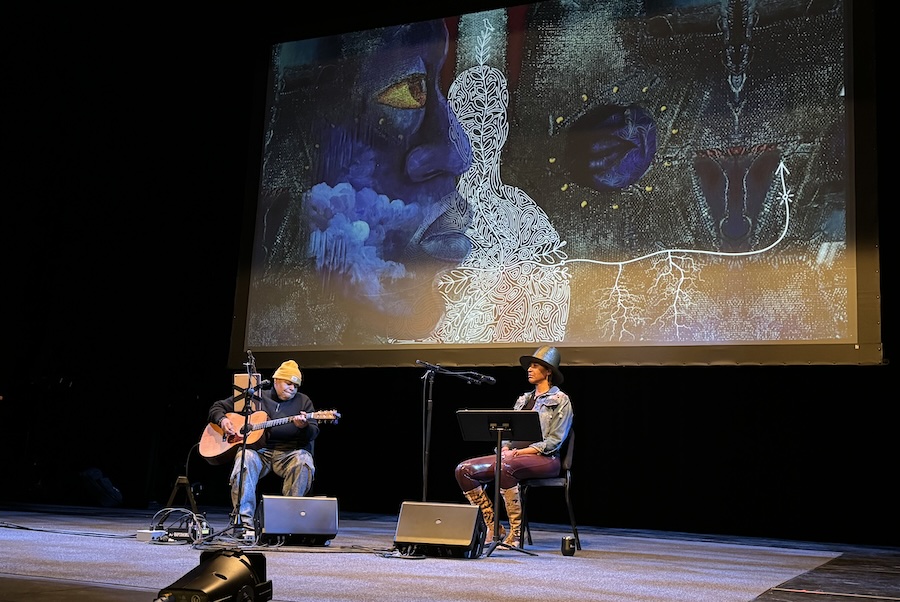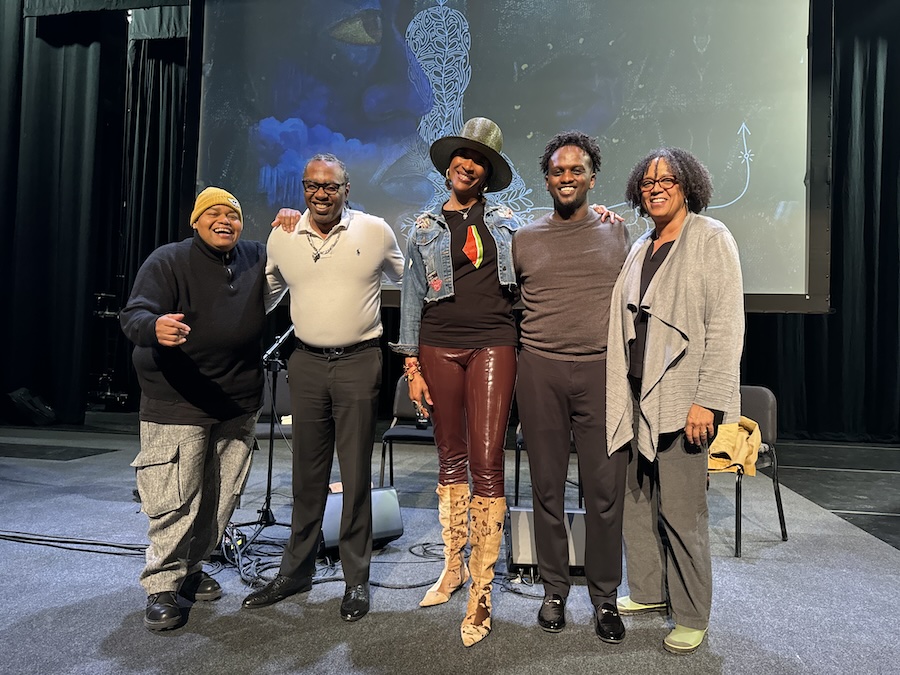'Parable Path' Returns to Maine With Music, Art, Poetry, and Messages
By Rebecca Goldfine
A former McKeen Visiting Fellow, Toshi Reagon is doing what she does so well: bringing artists and activists together to imagine and work toward a better future.
Reagon's collaborators, including Bowdoin professors Keona Ervin, Judith Casselberry, and Bianca Williams, have so far organized two campus events this spring that directly address carcerality and abolition. Carcerality refers to the use of imprisonment as a form of social control, typically over people of color, while abolition calls for freedom for the people most oppressed by this system.
A third event, a Theater for Social Change workshop, is planned for April 10, 6:30 p.m., at Ladd House. The McKeen Center and Maine Inside Out, a nonprofit that brings theater to Maine prisons, schools, and communities, will lead the program.
Going forward, Reagon will be returning to Bowdoin and Maine to "continue the collaboration," she said.
The recent events are an extension of Parable Path Maine, a creative, communal endeavor launched last year to galvanize people to care about and act on climate change, climate justice, and systemic inequality. Parable Path culminated in a performance of Reagon’s opera in Portland, Octavia E. Butler's Parable of the Sower, based on Butler’s dystopian novel.
“Remember your power, remember your mojo, remember that all of your collective voices can become the perfectly placed stone in the people’s slingshot. The pendulum is pulled all the way back, and we’re almost ready, just about ready to let it go.”
— Poet, artist, activist Liza Jessie Peterson speaking at Bowdoin, March 28, 2024
Art as Slingshot, as Activator
On March 28, Parable Path organizers put on an evening of film, poetry, music, and discussion in Pickard Theater. The event featured Reagon and three speakers whose personal experiences with incarceration have catalyzed them to fix the system.
Reagon first took the stage with New York-based playwright and poet Liza Jessie Peterson, who shared a documentary and read one of her written works. Reagon performed two of her songs on guitar. During the second half of the evening, Reagon and Peterson were joined by Maine activists Joseph Jackson and Ali Ali, who are reforming the state’s juvenile justice system.

The men, who have both been incarcerated—Jackson for nineteen years—described the impact that their nonprofit, Maine Youth Justice, has had. Since 2018, they have helped shut down one of two juvenile detention centers in the state and reduced the number of youth in cells from between 200 to 250 a day to thirty a day, according to Ali.
But before the group struck up a conversation about incarceration and how they use the arts to change people and society, the evening began, appropriately, with the arts. The first act was a screening of Peterson's film, Angola Do You Hear Us? Voices From a Plantation Prison.
Do You Hear Us?
The short black-and-white documentary follows Peterson as she attempts to perform her play The Peculiar Patriot at an infamous correctional facility in Louisiana. The prison is called Angola after the large plantation it replaced, and the plantation was named for the African homeland of many of its enslaved workers.
In the documentary, Peterson explains why she feels driven to perform The Peculiar Patriot to the 6,300 men in the country’s largest maximum-security prison.
Her one-woman show features a character called Betsy LaQuanda Ross "who makes regular visits to penitentiaries to boost the morale of her incarcerated friends and family." Peterson wrote the play based on her own experience teaching art to adolescents on Rikers Island, where New York's largest jail complex is located.
“It felt like a calling,” Peterson says in the film. “It was more than a performance, it felt like a mission, like I was on a mission to do something because of the significance of the land I was on [at Angola]. It was historical.”
She had already performed The Peculiar Patriot at thirty-five other prisons before she set her sight on Angola. “This was my dream,” she continues, “to be on a prison plantation and perform The Peculiar Patriot. Not just perform, but to activate.”
Angola’s administrators invited her in to entertain, not knowing what to expect because they “hadn’t done their homework,” she said. On the day she arrived, seven hundred men filed into the chapel to watch the show. But as they began to respond to her funny and provocative performance, prison officials panicked and shut down the play.
Nonetheless, the play—or really, half the play—had done its work. In the two years following her visit to Angola in 2020, about 300 prisoners were released, a huge increase from the one or two men freed per year in the years before the performance, she said.
“What happened was, that day at the chapel, the men were so electrified,” she said. A volunteer at Angola named Norris Henderson told the men after Peterson had left that if they “wanted to put their energy somewhere,” they should vote for political candidates he and his nonprofit, VOTE, had helped convince to run in Louisiana.
“But the men couldn't vote, so what could they do?” Peterson said. “They got on the phone and they called their family members, and their family members went and voted, and they elected two Black female judges, a new prosecutor, and they unseated an incumbent sheriff.”
“Through the activation of the art, in collaboration with Norris's activist boots on the ground…the men got on the phone, and they activated their family members who were able to change the outcome of the election. And the men are home and they are free,” she concluded.
“Keep moving your feet, keep speaking up, organize, strategize, be kind to one another, be fierce, be brave, help people, speak life, acknowledge the ancestors, and expect miracles. ”
—Liza Jessie Peterson
"Get as close as you can"
During the panel discussion, and in response to an audience member’s question about activist theater, Peterson explained why art can be a catalyst. “Art goes right to the heart,” she said. “If you can reach people's hearts, you can change their minds, and if you can change their minds, you can change their actions, and actions lead to liberation.”
Theater and art, added Jackson, are healing and restorative, especially for those who are powerless and vulnerable. “When people are traumatized under these systems, being able to name what is happening to them, to put it outside their body and look at it, that is empowering,” he said.
Ali said that theater had given him the courage to use his voice. Incarcerated when he was just fourteen years old, he was in jail when Maine Inside Out arrived to work with the young people to turn their stories into a play. “We acted in front of incarcerated youth," he said. "I’m talking the toughest kids of the state, and they loved it." When he and his troop performed at a local university in front of 500 people, they earned a standing ovation.
“Theater gave us an expression, it gave us a way out to tell our stories,” he said. “What theater did was give us the opportunity to become a campaign, to work on organizing, to run for office.”
(For Maine readers: Ali urged the audience to call their local representatives to vote for two pending bills in the Maine legislature, LD 288 and LD 1779, which will help young people avoid being ensnared in the criminal justice system.)
“The reality is that these kids have mental health issues, the have trauma, they are harmed, they can't defend themselves, they are trying to survive in the streets, and [the government is] incarcerating them,” Ali said. “In the majority-white neighborhoods, if youth have an issue, they have rehab, they have therapists, they have mental health counseling, they have medications, they have ways to fix the issue. While in urban communities, there is none, the only solution is the school-to-prison pipeline.”
Peterson credited the teenagers she taught at Rikers Island with turning her into an anti-incarceration “evangelist.” “It was the young people, the adolescents who gave me my stripes, and they made me earn every stripe!” she said. “Adolescents are wild—wild in the sense is they want to push your buttons and go beyond boundaries, because that is the nature of the adolescent developing mind. Black and Latino youth are criminalized for that development process.”
She added, "They gave me the courage, the fire, and the passion, and they were my first entry point, the adolescents, into learning about the system and what is happening to our children."
After listening to the speakers, Reagon said this is the era "of coming together or perish," and that it is too easy for people to turn inwards or turn away when they feel overwhelmed or believe problems are insurmountable, she added.
"We have to do more than we ever thought we could do," Reagon said. "I think a lot of times...we do that thing that comes natural, which is to back off. But I think we should get as close as we can. Everyone has a level, but whatever level you're at, get ten percent closer."
“Imagine the world you want to see, imagine the world you want to see, imagine, imagine, imagine the world you want to see after the wicked empires and all these mad men crumble….We are so much more than we’ve been told. ”
—Liza Jessie Peterson